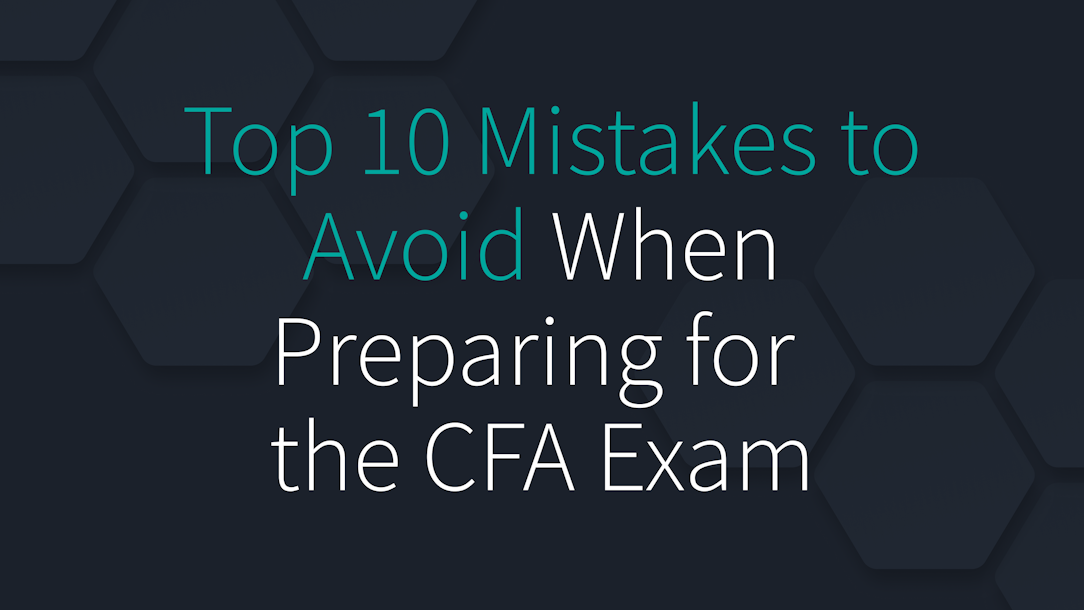
Top 10 Mistakes to Avoid When Preparing for the CFA Exam
Success on the CFA exam isn’t just about hard work—it’s about smart preparation. By avoiding these common pitfalls, candidates can significantly increase their efficiency, confidence, and chances of passing.
The CFA exam is one of the most challenging financial certifications, demanding months of focused study and strategic preparation. Many candidates invest hundreds of hours preparing but still fall short due to common missteps. Success isn’t just about how much time you put in—it’s about how effectively you use that time. Avoiding these top mistakes can drastically improve your chances of passing.
1. Underestimating the Exam’s Difficulty
Some candidates assume that if they have a strong finance background or an MBA, the CFA exam will be straightforward. This mindset is dangerous. The CFA Institute designs the exam to test application, analysis, and endurance, not just theoretical knowledge. Even seasoned professionals need structured preparation to pass.
2. Starting Too Late or Cramming Near the End
Procrastination is a CFA candidate’s worst enemy. With an average recommendation of 300+ study hours per level, trying to compress months of material into a few weeks is a recipe for failure. Start early, plan effectively, and maintain consistency to absorb concepts properly.
3. Relying Too Heavily on One Type of Study Material
Some candidates rely exclusively on the official CFA curriculum or third-party prep providers. The best approach is a mix of both:
- Use official CFA materials for depth.
- Use concise third-party study notes for efficient review.
- Take practice questions to reinforce learning.
Diverse resources create a comprehensive understanding of the exam content.
4. Neglecting Practice Questions and Mock Exams
Many candidates make the mistake of focusing solely on reading. But reading alone doesn’t guarantee retention.
- Practice questions reveal weak areas.
- Mock exams simulate real test conditions and build endurance.
- Reviewing mistakes helps identify knowledge gaps.
Ideally, take at least 3-5 mock exams under timed conditions before the actual test.
5. Ignoring CFA Exam Topic Weightings
Not all CFA exam prep topics are created equal. Some sections, like Ethics, FRA (Financial Reporting and Analysis), and Equity, have higher weightings than others. Prioritizing your study time according to CFA Institute’s topic weight distribution can maximize your score.
6. Poor Time Management During the Exam
A common pitfall is spending too much time on a single question. Candidates must learn to:
- Allocate time based on question weight.
- Move on when stuck—don’t let one question derail your progress.
- Use the flag feature in computer-based exams to revisit tough questions later.
Proper time management can be the difference between passing and failing.
7. Memorization Without Understanding Concepts
Rote memorization may work for formulas, but the CFA exam is about conceptual application. Candidates must:
- Understand why a formula works, not just how to use it.
- Learn to apply concepts in different scenarios.
- Practice solving problems intuitively, not just mechanically.
Without conceptual understanding, complex, scenario-based questions will be difficult to tackle.
8. Skipping Ethics or Leaving It for the Last Minute
Many candidates assume they can cram Ethics at the last minute—this is a major mistake. The Ethics section plays a critical role in borderline cases and requires pattern recognition, not just memorization.
- Read the Ethics material multiple times.
- Practice real-world application scenarios.
- Pay attention to how the CFA Institute applies the Ethics Adjustment.
9. Not Taking Care of Mental and Physical Well-Being
Burnout is real, and it’s a silent score-killer. Candidates often sacrifice sleep, exercise, and social life, thinking more study hours equal better results. However, overstudying without balance leads to exhaustion, stress, and low retention.
- Get 7–8 hours of sleep.
- Take strategic breaks to recharge.
- Incorporate exercise and healthy nutrition for optimal brain function.
A sharp mind performs better than a tired one.
10. Not Having a Realistic Exam Day Strategy
Even well-prepared candidates can struggle on exam day due to poor planning.
- Arrive early to avoid stress.
- Practice exam-day scenarios (using an on-screen calculator, navigating vignettes, etc.).
- Stay composed—even if the first few questions are tough, don’t panic.
A strong test-taking strategy can boost performance and confidence.
Conclusion
Success on the CFA exam isn’t just about hard work—it’s about smart preparation. By avoiding these common pitfalls, candidates can significantly increase their efficiency, confidence, and chances of passing.
At Salt Solutions, we provide structured, CFA Institute-validated study materials designed to help you avoid these mistakes. Whether you’re tackling CFA Level 1, preparing for CFA Level 2, or strategizing for CFA Level 3, our courses are built to optimize your study process. Explore our full range of CFA study tools and CFA study materials and notes. Study smart, stay consistent, and let Salt Solutions guide you to CFA success!